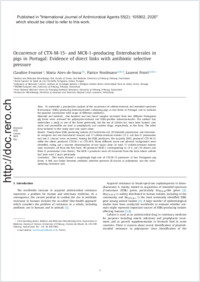Occurrence of CTX-M-15- and MCR-1-producing Enterobacterales in pigs in Portugal: evidence of direct links with antibiotic selective pressure
- Fournier, Claudine Medical and Molecular Microbiology Unit, Faculty of Science and Medicine, University of Fribourg, Switzerland
- Aires-de-Sousa, Marta Escola Superior de Saúde da Cruz Vermelha Portuguesa, Lisbon, Portugal - Laboratory of Molecular Genetics, Instituto de Tecnologia Química e Biológica António Xavier, Universidade Nova de Lisboa, Oeiras, Portugal
- Nordmann, Patrice Medical and Molecular Microbiology Unit, Faculty of Science and Medicine, University of Fribourg, Switzerland - INSERM European Unit, University of Fribourg, Switzerland - Swiss National Reference Centre for Emerging Antibiotic Resistance, University of Fribourg, Switzerland - Institute for Microbiology, University of Lausanne and University Hospital Centre, Lausanne, Switzerland
- Poirel, Laurent Medical and Molecular Microbiology Unit, Faculty of Science and Medicine, University of Fribourg, Switzerland - INSERM European Unit, University of Fribourg, Switzerland - Swiss National Reference Centre for Emerging Antibiotic Resistance, University of Fribourg, Switzerland
-
01.02.2020
Published in:
- International Journal of Antimicrobial Agents. - 2020, vol. 55, no. 2, p. 105802
English
AimsTo undertake a prospective analysis of the occurrence of colistin-resistant and extended-spectrum ß-lactamase (ESBL)-producing Enterobacterales colonizing pigs at two farms in Portugal, and to evaluate the putative correlations with usage of different antibiotics.Materials and methods: One hundred and two faecal samples recovered from two different Portuguese pig farms were screened for polymyxin- resistant and ESBL-positive Enterobacterales. The authors had undertaken a study at one of the farms previously, but the use of colistin has since been banned; zinc oxide and amoxicillin are used as prophylactic and curative drugs, respectively, at this farm. The other farm included in this study used zinc oxide alone.Results: Ninety-three ESBL-producing isolates (62 Escherichia coli, 29 Klebsiella pneumoniae, one Enterobacter aerogenes and one Enterobacter cloacae) and 17 colistin-resistant isolates (12 E. coli, four K. pneumoniae and one E. cloacae) were recovered. Among the ESBL producers, the majority (84%) produced CTX-M-15, while the others produced CTX-M-1 or CTX-M-9. Many different strain and plasmid backgrounds were identified, ruling out a massive dissemination of one major clone. In total, 17 colistin- resistant isolates were recovered, all from the first farm. All produced MCR-1, corresponding to 12 E. coli (10 clones) and three K. pneumoniae (two clones). The MCR-1 producers were all recovered from the farm where colistin had been used 2 years previously.Conclusion: This study showed a surprisingly high rate of CTX-M-15 producers at two Portuguese pig farms. A link was found between antibiotic selective pressure (ß-lactam or polymyxin) and the corresponding resistance rate.
- Faculty
- Faculté des sciences et de médecine
- Department
- Médecine 3ème année
- Language
-
- English
- Classification
- Biological sciences
- License
- License undefined
- Identifiers
-
- RERO DOC 328220
- DOI 10.1016/j.ijantimicag.2019.09.006
- Persistent URL
- https://folia.unifr.ch/unifr/documents/308591
Statistics
Document views: 89
File downloads:
- nor_ocm.pdf: 311
